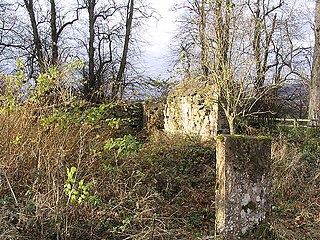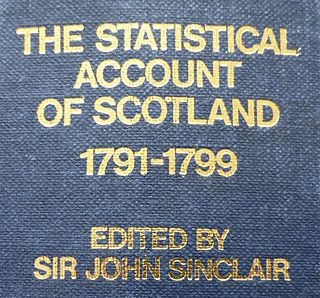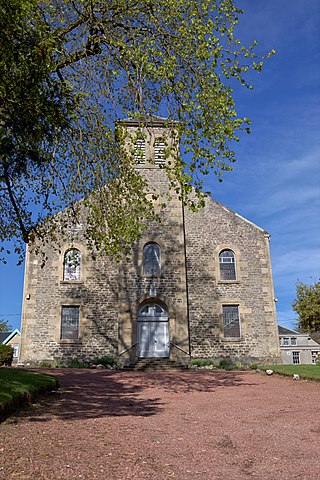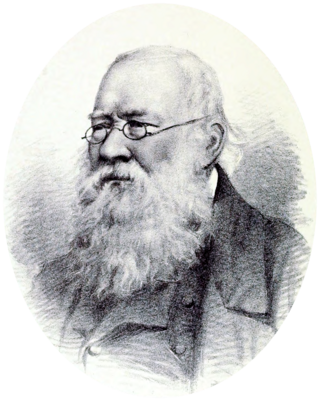Related Research Articles

Alexander Carlyle MA DD FRSE was a Scottish church leader, and autobiographer. He served as Moderator of the General Assembly of the Church of Scotland in 1770/71.
Thomas Gillespie was a Scottish minister of the Church of Scotland. He was founder of the Synod of Relief. Thomas Gillespie, born in 1708, at Clearburn, Duddingston, was the son of a well-to-do brewer and bonnet-laird — the only son of a second marriage. An interview with Thomas Boston, arranged by his mother, turned his thoughts to the ministry. On the completion of his Arts course in Edinburgh, he entered the Divinity Hall. After some months, however, he left for the Divinity Hall of the Secession Church in Perth. A few weeks’ experience of its narrowness being more than enough, he betook himself to Northampton to complete his studies under Philip Doddridge. He was ordained by a "classis" of the English Presbyterians. Presented and called to Carnock, he was inducted by the Presbytery of Dunfermline in 1741. In the early years of his ministry he was a leader in the Cambuslang and Kilsyth Revivals, and became a trusted correspondent of George Whitfield and Jonathan Edwards. Taking his stand, with the majority of the Presbytery, against the Inverkeithing Intrusion, he was summarily deposed by the General Assembly of 1752. In 1761, with two other ministers and their flocks, he formed a new body — the Presbytery of Relief, which had attained a quite considerable place in many parts of Scotland, by the time of his death in 1774.
Robert Flint LLD DD was a Scottish theologian and philosopher who wrote also on sociology.

David Calderwood was a Scottish minister of religion and historian. Calderwood was banished for his nonconformity. He found a home in the Low Countries, where he wrote his great work, the Altare Damascenum which was an attack on Anglican episcopacy. He was present at the Glasgow Assembly in 1638, and saw episcopacy and the high church liturgy swept away from the Church of Scotland. He died at Jedburgh, a fugitive from his parish of Pencaitland; and buried in the churchyard of Crailing, where the first years of his ministry were spent.

Ronald William Vernon Selby WrightCVO TD JP FRSE FSAScot was a Church of Scotland minister. He became one of the best known Church of Scotland ministers of his generation and served as Moderator of the General Assembly of the Church of Scotland in 1972/73.

The Statistical Accounts of Scotland are a series of documentary publications, related in subject matter though published at different times, covering life in Scotland in the 18th, 19th and 20th centuries.

James Meek FRSE (1742–1810) was Minister of Cambuslang from 1774 until his death. He was Moderator of the General Assembly of the Church of Scotland in 1795, but is most remembered as the model Enlightenment cleric who wrote the entry for Cambuslang in the First Statistical Account of Scotland.

John Robertson, (1768–1843) was Minister of Cambuslang from 1810 until his death. He was responsible for that Parish's entry in the Second Statistical Account of Scotland dated 1836, though he did not write it himself.
The History of Cambuslang is explained to a great deal by its geography. Now in South Lanarkshire, the town of Cambuslang is an ancient part of Scotland where Iron Age remains loom over 21st century housing developments. It has been very prosperous over time, depending first upon its agricultural land, then the mineral resources under its soil.

Robert Blair was a Scottish minister and a Gaelic scholar.
William M'Culloch was Minister of Cambuslang during the extraordinary events of the Cambuslang Work (1742) when 30,000 people gathered in the hillsides near his church for preaching and communion. Many were there struck by their own depravity and horrified at the probable punishment after death. Trembling, wailing, great pain, nose-bleeding and other strange behaviour was followed in some cases by striking conversions when they suddenly felt accepted by Christ. This gave rise to great rejoicing and singing. It was later calculated that about 400 people had been converted, though many had backslided. The Reverend M’Culloch was a strange person to be at the centre of this phenomenon — one that was being repeated in the American Colonies at the time. He was a poor preacher and claimed never to have experienced the strong feelings of sin or conversion that so many others had reported.

Abbeygreen Church is a congregation of the Free Church of Scotland in the small town of Lesmahagow, Lanarkshire. As a Christian congregation, it is presbyterian and reformed; holding the Word of God, the Holy Bible, as the supreme rule of life and doctrine and the Westminster Confession of Faith as a sub-ordinate standard, which helps explain the doctrines of the Christian faith. Being Presbyterian, it serves as part of the Free Church of Scotland Presbytery of Glasgow and seeks to faithfully serve God in Lesmahagow and the surrounding area. Having a missional outlook it is involved with a number of missionary organizations including, but not only, UFM Worldwide and Rose of Sharon Ministries, and helps with the organization and support of the Scottish Reformed Conference.
John Howison was Minister in the Parish of Cambuslang during a turbulent time in Scotland’s history. He was imprisoned several times for his campaign for a Presbyterian, as opposed to Episcopal structure for the Church of Scotland.. He also often reprimanded the King James VI for taking the advice of evil counsellors. He quarrelled with his own parishioners and was convicted of publishing a doctored version of an Act of Parliament, but he died peacefully in Cambuslang, apparently resigned to accepting Bishops in the Kirk.

St. John's Renfield Church is a parish church of the Church of Scotland, serving Kelvindale in the west end of Glasgow, Scotland. It is within the Church of Scotland's Presbytery of Glasgow.

Baillieston St Andrew's Church is a congregation of the Church of Scotland, a member of the Presbyterian Church. The church building is located on the corner of Bredisholm Road and Muirhead Road, Baillieston, Glasgow, Scotland. The church today serves the town of Baillieston.
Andrew Grant was a Scottish merchant and Liberal politician who sat in the House of Commons from 1878 to 1885.

Patrick Clason was a Scottish minister who served as Moderator of the General Assembly to the Free Church of Scotland in 1848/49.

Archibald Scott (1837–1909) was a Scottish minister who served as Moderator of the General Assembly of the Church of Scotland in 1896.
Robert Jamieson (1802–1880) was a minister of the Church of Scotland and religious author, who served as Moderator of the General Assembly in 1872.
Dugald Butler (1862–1926) was a 19th/20th century Scottish minister, remembered as a prolific author on a variety of subjects, but mainly historical, most of which are still in print. He was minister of several important churches including the Tron Kirk on the Royal Mile in Edinburgh. He was an expert on Robert Leighton.
References
- ↑ C D Waterston; A Macmillan Shearer (July 2006). Former Fellows of The Royal Society of Edinburgh, 1783–2002: Part 1 (A–J) (PDF). ISBN 090219884X. Archived from the original (PDF) on 24 January 2013. Retrieved 18 September 2015.
{{cite book}}:|website=ignored (help)
- Rev Dr Hew Scott Fasti ecclesiae scoticanae : the succession of ministers in the Church of Scotland from the reformation . Synod of Glasgow and Ayr; Presbytery of Hamilton (Edinburgh 1914)